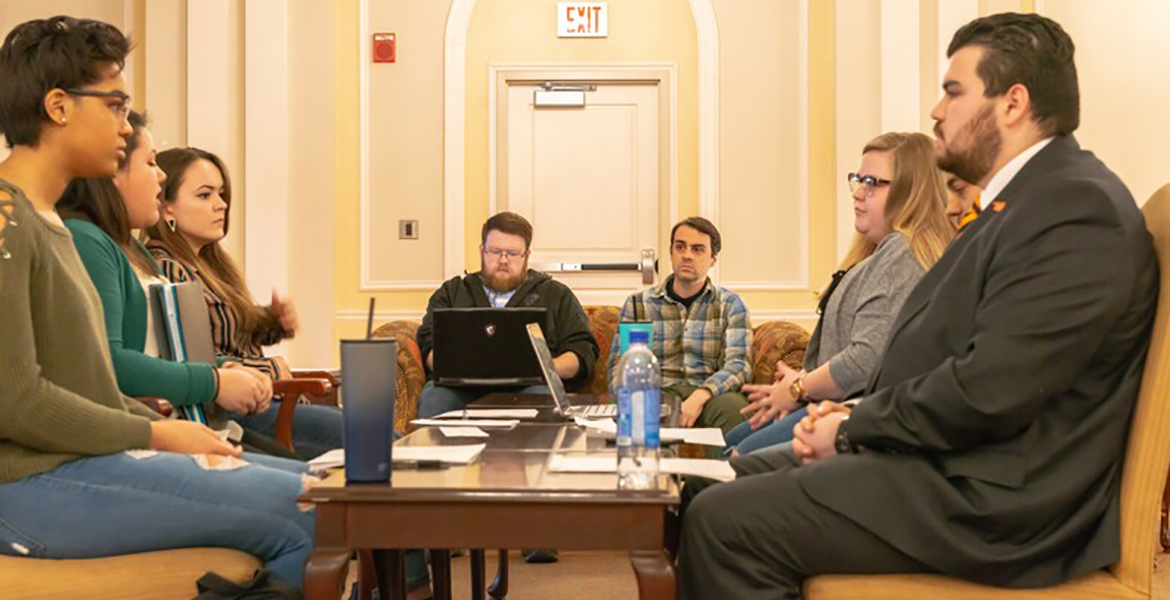
Ethics Bowl Team reaches quarterfinals in second appearance at nationals
Tuesday, March 16, 2021
Oklahoma State University’s Ethics Bowl Team competed in the Association for Practical and Professional Ethics’ (APPE) Intercollegiate Ethics Bowl on Feb. 26 and 27, making it to the quarterfinals alongside teams from Harvard, Stanford, USMA West Point and other prestigious schools.
“We certainly are in good company,” said Department of Philosophy Head Dr. Scott Gelfand. “I have so much pride in these students. These were the top eight teams in the whole United States! … When I listened to them this year and compared it to last year, the amount of polish and confidence just filled my heart with joy. And they know it. They know how much they’ve developed.”
This was the Ethics Bowl Team’s second appearance at nationals in their five-year history, but unlike last time, 2021’s competition was a virtual event.
“There was still some electricity in the air, even though it was all on Zoom,” said Daniel Trippett, the team’s coach and a lecturer in the Department of Philosophy. “Even though it was virtual, the atmosphere was exciting. Since this was nationals, you knew everybody there was deserving and skilled. We had to bring our ‘A’ game.”
Prepping for the contest proved trickier than usual because of COVID-19 restrictions on team meetings, Ethics Club president and journalism major Jennifer Maupin explained.
“Normally, we all meet in a classroom and we can have several conversations going at once. Because we were on Zoom, it definitely limited our ability to prepare the way we were used to."
Despite the pandemic hurdles, the team successfully studied for all 17 cases provided by APPE, with topics ranging from quarantines, oil pipelines and LGBTQ+ rights to social media censoring, emotional support animals and conspiracy theories. OSU participated in five rounds over two days, which totaled about 10 hours of active discussion.
“Just as with sports, you can coach a team, make a play [or] argument and try to execute it, but there are so many variables,” Trippett said. “The students don’t know what they will be asked to present or what the questions will be, so you start to learn that a lot of your success depends on being able to adapt and improvise in the moment.”
“It’s such a testament to our students and their hard work and fast thinking to be included in a placement [with] elite universities such as Harvard and Stanford,” Trippett continued. “The department is extremely proud.”
In addition to Maupin, four other students competed at nationals: Taylor Gladney (psychology), Parker Plank (engineering), Leigh Welch (sociology and women's studies) and Grayson Brown (psychology and philosophy).
Maupin said making it to the quarterfinals “really took us by surprise,” as they only won one round at their first nationals appearance. “I was honestly just hoping to at least win two.” This year they went 3 for 4 in prelims to make it to the quarterfinal round.
“The most fulfilling part of the competition was knowing we were included in the conversation about important moral questions that truly do impact our daily lives,” Maupin added. “As college students, we often get discredited as not knowing how the world works yet or being ignorant to worldly issues. This competition really gives us a seat at the table to show that we do know what we are talking about and we might have creative solutions that no one has discussed before.”
That culture of open communication is a primary aim of the club, Gelfand said.
“We’re training these young people to deal with controversial, ethical and political issues in a productive way, not a dismissive, destructive way that we see so much in society right now,” Gelfand said. “I love to see the students talk and argue with each other. Their willingness — their joy — in talking about these issues in a calm way without getting overly emotional or angry is beautiful.”
Next up for the Ethics Club is hosting the 16-team Bioethics Bowl on April 10.
“I can imagine at any given time there will be around 150 people participating, and our job is to make sure it runs smoothly and to deal with any glitches when they occur,” said Gelfand, who has also helped write cases for the competition, recruit judges and moderators, and otherwise prepare for the event. “It’s a major endeavor.”
Visit philosophy.okstate.edu/undergraduate/ethics-club for more about the Ethics Club, or visit go.okstate.edu/undergraduate-academics/majors/philosophy for information about how to major or minor in Philosophy.
MEDIA CONTACT: Elizabeth Gosney | College of Arts and Sciences | 405-744-7497 | egosney@okstate.edu
